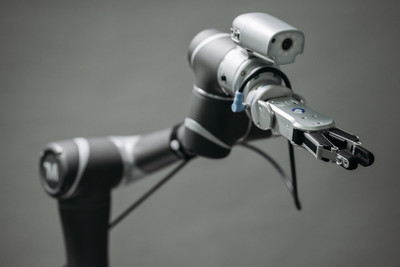PeerJ Section
Applications of Artificial Intelligence
Welcome to your community’s home at PeerJ. Sections are community led and exemplify a research community’s shared values, norms and interests.
33,378 Followers
Section Highlights
View all Applications of Artificial Intelligence articles

5 February 2026
Anomaly synthesis and detection in accounting data via a generative adversarial network
"This paper’s main strengths lie in its novel MF-GAN framework that unifies multimodal data synthesis and anomaly detection within a single architecture, effectively addressing the challenges of high-dimensional, heterogeneous accounting data."
 Muhammad Asif, Handling Editor
Muhammad Asif, Handling Editor
 Muhammad Asif, Handling Editor
Muhammad Asif, Handling Editor
2 February 2026
Design of an intelligent optimization framework for corporate financial management based on GA-FL-transformer
"This study introduces a novel GA-FL-Transformer framework that tightly integrates Transformer-based multi-source feature fusion with attention-guided genetic algorithm and fuzzy logic optimization in a closed-loop decision-making system. By embedding attention weights into genetic encoding and fuzzy rule evolution, the framework enables adaptive, data-driven optimization under dynamic financial environments. Experimental results on Compustat and CRSP demonstrate clear performance gains over existing methods, validating the effectiveness, scalability, and practical relevance of the proposed approach for intelligent enterprise financial decision-making"
 Muhammad Asif, Handling Editor
Muhammad Asif, Handling Editor
 Muhammad Asif, Handling Editor
Muhammad Asif, Handling Editor
27 January 2026
A new era in identification of tick genera; artificial intelligence for precision and speed
"This article represents an important contribution to the application of artificial intelligence in vector surveillance and medical entomology. Its significance lies in demonstrating how deep learning techniques can be leveraged to improve the identification of tick genera with greater precision and speed compared to conventional methods. The work is timely, as vector-borne diseases are a global health concern, and reliable automated tools can directly impact both research and public health preparedness.
The potential impact on the field is twofold: first, it advances the integration of AI into practical workflows for biological and medical image analysis; second, it opens opportunities for scalable and rapid surveillance systems that may enhance outbreak detection and response. While further validation and clinical contextualization may be needed, the approach described provides a strong foundation for future developments and broader adoption in similar domains."
 José Alberto Benítez-Andrades, Handling Editor
José Alberto Benítez-Andrades, Handling Editor
 José Alberto Benítez-Andrades, Handling Editor
José Alberto Benítez-Andrades, Handling Editor
15 January 2026
Energy awareness prediction model based on multi-agent decision-making modeling in green supply chain marketing strategy
"This paper introduces a novel energy awareness prediction model for green supply chain marketing under the dual carbon strategy. By integrating evidence theory for robust multi-source data fusion, K-means clustering to identify distinct behavioral patterns among supply chain agents, and BiLSTM for temporal trend forecasting, the framework effectively models dynamic multi-agent decision-making. Experimental results demonstrate superior accuracy, with reduced RMSE and MAE, and relative error below 8% compared to baselines like CNN-BiLSTM, offering a practical tool for sustainable marketing interventions."
 Muhammad Asif, Handling Editor
Muhammad Asif, Handling Editor
 Muhammad Asif, Handling Editor
Muhammad Asif, Handling Editor
7 January 2026
Multi-step-ahead forecasting of bike-sharing demand using multilayer perceptron model with additional timestamp features
"This manuscript tackles the problem of predicting bike-sharing demand at the station level to optimize bike availability, a practical and relevant urban mobility challenge. It proposes a multi-step-ahead MLP-based forecasting model that uses past rental data and temporal features, and systematically compares its performance against several machine learning baselines."
 Ana Maguitman, Handling Editor
Ana Maguitman, Handling Editor
 Ana Maguitman, Handling Editor
Ana Maguitman, Handling Editor
5 January 2026
Clustering student argumentation types by implementing a multi-document clustering model: a combination of Pytorch and BERT
"This work offers an interesting contribution to the field of automated evaluation of argumentative writing by showing how the integration of discourse-based analysis with transformer-enhanced multi-document clustering can improve the assessment of student argument quality."
 Ana Maguitman, Handling Editor
Ana Maguitman, Handling Editor
 Ana Maguitman, Handling Editor
Ana Maguitman, Handling Editor
12 December 2025
A semantic enhanced clothing recommendation system based on implicit trust graphs and ontology web language
"This is a good contribution in clothing recommendations system."
 Muhammad Asif, Handling Editor
Muhammad Asif, Handling Editor
 Muhammad Asif, Handling Editor
Muhammad Asif, Handling Editor
9 December 2025
Emotion classification using advanced neural networks on sentence-level data
"The authors have presented an interesting study of how neural networks can be used to classify emotions on imbalanced data."
 Juan Lara, Handling Editor
Juan Lara, Handling Editor
 Juan Lara, Handling Editor
Juan Lara, Handling Editor
9 December 2025
Robust coffee plant disease classification using deep learning and advanced feature engineering techniques
"This study describe a unique original application of deep learning for agricultural sciences."
 Davide Chicco, Handling Editor
Davide Chicco, Handling Editor
 Davide Chicco, Handling Editor
Davide Chicco, Handling Editor
25 November 2025
Cursive character prediction using a deep learning model
"As a reviewer noticed, the article contains huge improvements for handwritten sign recognition through deep learning."
 Davide Chicco, Handling Editor
Davide Chicco, Handling Editor
 Davide Chicco, Handling Editor
Davide Chicco, Handling Editor
Collections
View all 
RiTA 2023: Robotics and AI for Digital Futures
International Conference on Machine Learning and Intelligent Systems (MLIS)
Revolutionizing Healthcare: The Role of AI and Machine Learning
Knowledge-infused System for Intelligent Ocean Applications
Artificial Intelligence for Mental Health: Advancements, Challenges, and Ethical Implications
33,378 Followers







